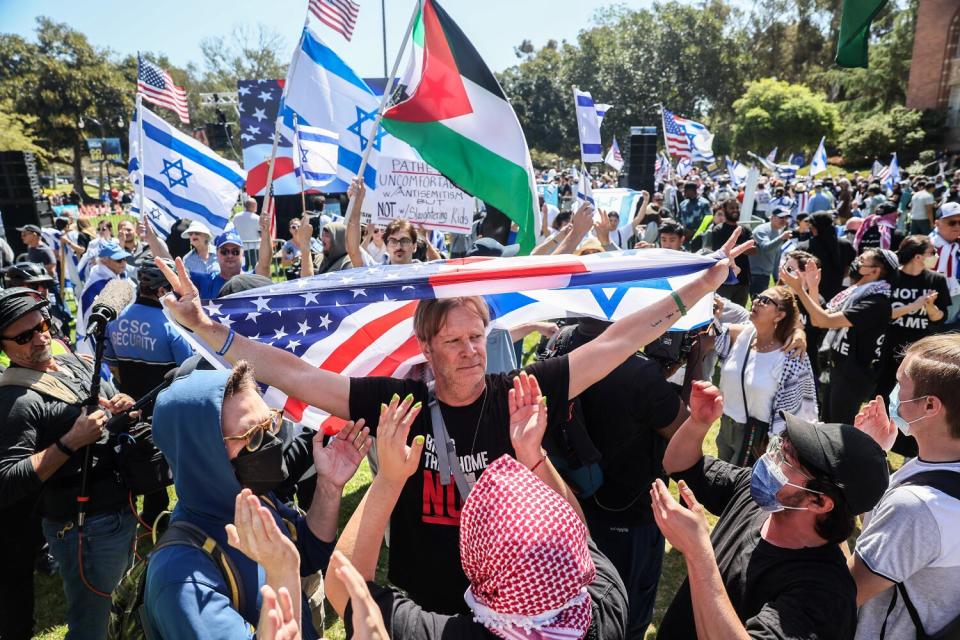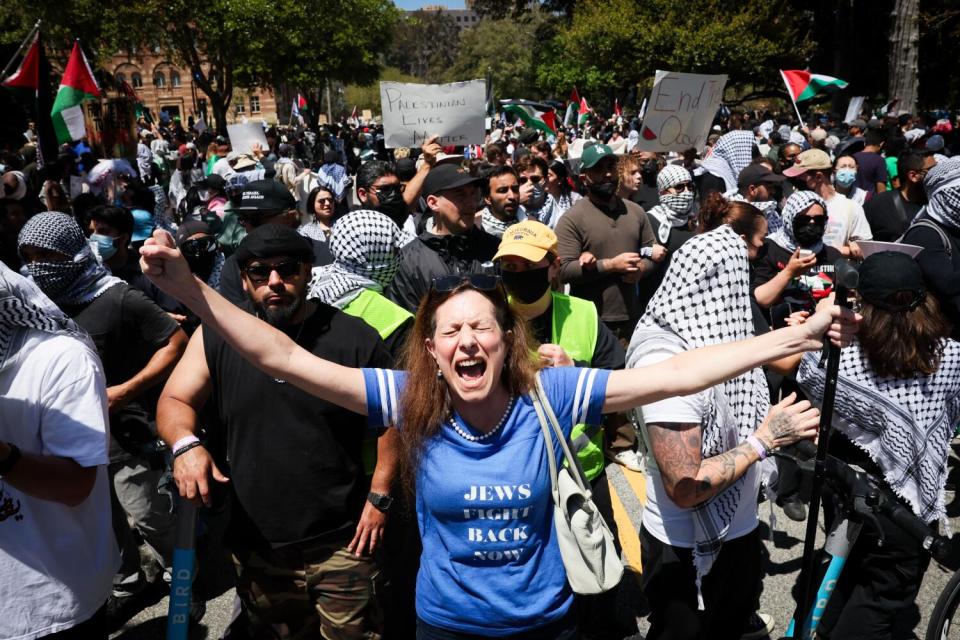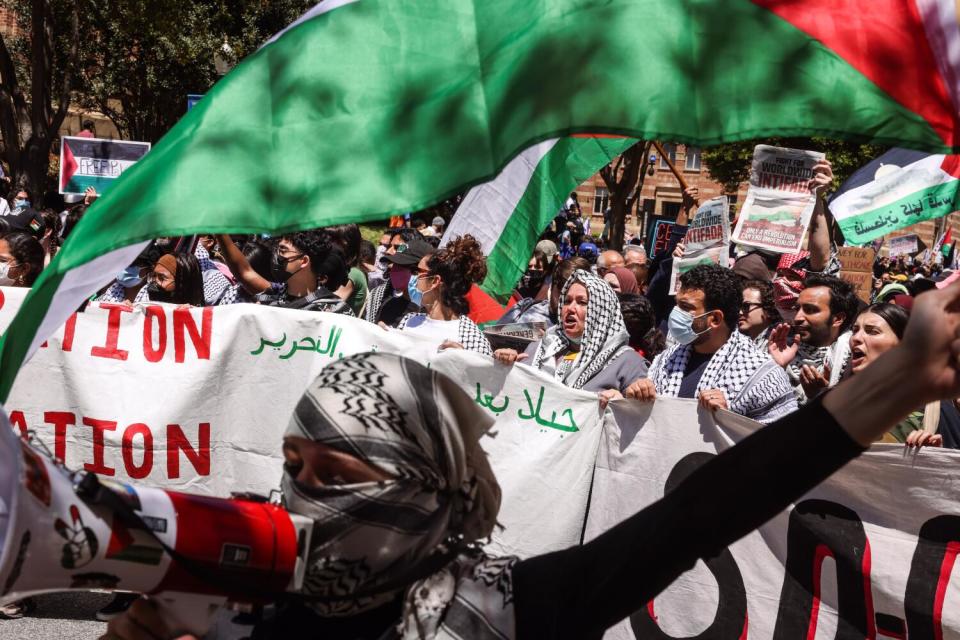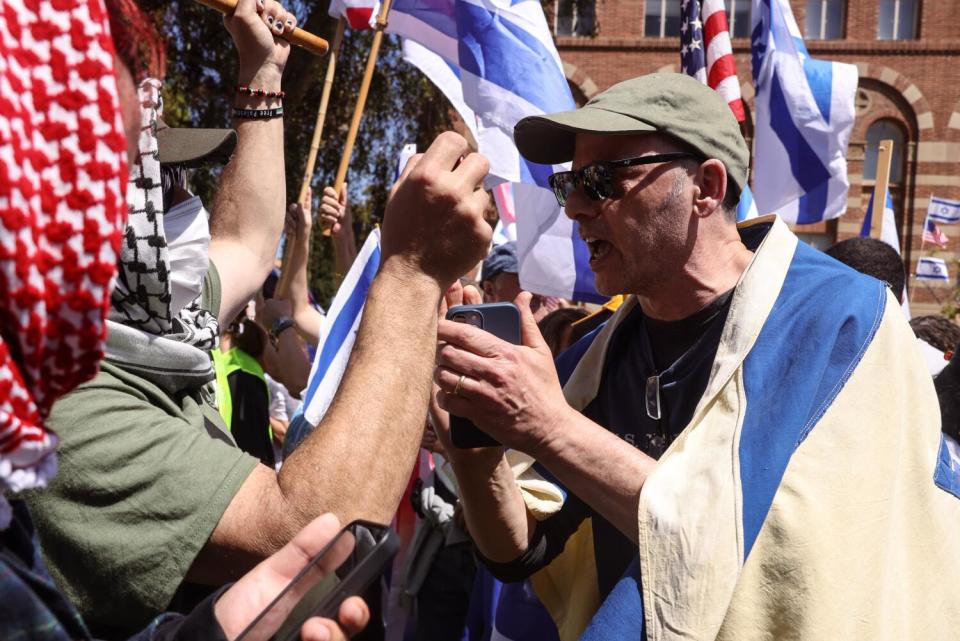Dueling Gaza protests at UCLA draw hundreds as USC sees peaceful demonstration
Demonstrators supporting and opposing Israel over the war in Gaza clashed in a large and noisy but mostly peaceful assembly at UCLA on Sunday, shouting slogans and pulling at police barricades not far from where pro-Palestinian students have maintained a tent encampment for days.
Hundreds of demonstrators gathered on the grass at UCLA’s Dickson Court, waving banners, listening to speeches and sometimes yelling obscenities at one another. Reporters witnessed minor scuffles, but organizers had come armed with private security, and ended the demonstration with a call for attendees to leave peacefully. Campus police showed up at 2:30 p.m.
The protest came one day after police were called in at USC, where pro-Palestinian protesters returned with tents and reestablished an encampment in Alumni Park, days after 93 people were arrested in campus demonstrations.

At UCLA, supporters draped in Israel’s flag and waving smaller U.S. and Israel flags made their way to the front of a screen set up on the lawn by organizers of the rally, held to protest a similar pro-Palestinian encampment. To one side, group of men and women in kaffiyeh scarves linked arms, attempting to block access to the stage, demonstrators screaming and shouting even as speeches started.
Read more: UC rejects calls for Israel-related divestment, boycott driving pro-Palestinian protests
Sunday’s UCLA counterprotest was organized by the nonprofit Israeli-American Council, which on Thursday used social media to denounce pro-Palestinian demonstrations across U.S. campuses.
“It is utterly unacceptable that any university campus should become a platform for pro-terror and anti-American activities,” the statement read in part, calling the protests “overtly antisemitic.”
“We demand that university leaders and governing bodies nationwide exhibit zero tolerance for organizations that support terrorism and violence ... [and] take swift and decisive action as permitted by law to halt these violent demonstrations.”
Read more: Photos: Tensions grow as pro-Palestinian demonstrations on college campuses continue
But a representative for the student encampment stressed that their target was not Israel but the university itself.
“We want UCLA to divest from corporations that are profiting from the genocide in Gaza … we are trying to get UCLA to divest because UCLA has blood on its hands," said Kaia Shah, a 2023 UCLA graduate who now works for the university as a researcher.

Shah said the encampment started Thursday with 200 people and has since grown, with no arrests or other physical pushback from the university. “UCLA has continued to ignore us," she said, prompting efforts to enlarge the encampment and elicit a university response.
She said those behind the plywood barricade sought to remain focused on what was happening in Gaza, not on the campus lawn. “We’re doing our best to stay levelheaded."
At the center of their conflict is the Oct. 7 attack by Hamas that killed 1,200 people and took 240 hostages, and Israel's retaliatory war on the Palestinian territory. Gaza health authorities say Israeli forces have killed more than 34,000 Palestinians. The United Nations says roughly 2 million civilians in Gaza are now living in near-famine conditions.
The conflict has ignited demonstrations at university campuses across the United States in recent weeks, and resulted in the arrests of more than 700 people, according to various news sources.

At both UCLA and USC, the protests have been organized in support of Palestinians in Gaza, and have drawn counterprotesters to the outskirts of the encampment to rally against Hamas and call for release of the remaining Israeli hostages.
"The Jewish students at UCLA are brilliant and resilient and they’re proud and they’re loud,” Dan Gold, executive director of the Hillel at UCLA, told demonstrators from the pro-Israeli stage set up on the campus lawn Sunday. “We are on the right side of history.”
A young woman sat shaded by an Israeli flag, blood visible on her scalp, awaiting medical attention after she said she was shoved to the ground by another demonstrator while attempting to retrieve her fallen flag. Private security guards, meanwhile, attempted to restrict access to the pro-Israel rally.
Across the lawn, demonstrators carried signs that ranged from a handmade "Free Hugs Jewish Students" to pre-printed "I go bananas for Israel" — a taunt aimed at reports of someone with a banana allergy in the pro-Palestinian encampment, now encircled by a protective wall of plywood. Through gaps in the wood, a person waved a large Palestinian flag.
When one demonstrator began throwing peanuts at others, UCLA alum Randy Fried stepped in.
“We make peace when we find the ability to talk to one another. If we want them to listen to us, even if they’re wrong, we have to at least find a way to listen to them,” said Fried, who said he belonged to a social justice organization and whose former teacher is among the hostages still held in Gaza.
"I would argue that most people on this side of the fence have skin in the game," Fried said, referring to those on the pro-Israel side of Sunday's security barriers.

After reports that demonstrators were crossing those barriers, a UCLA spokesperson voiced distress. "UCLA has a long history of being a place of peaceful protest," Mary Osako, the vice president for strategic communications, said in a statement released by the university press office. "We are heartbroken about the violence that broke out."
The head of the Israeli-American Council, Elan Carr, confirmed Sunday that the group had organized the counterprotest at UCLA, as well as others at demonstrations across the country, and had hired multiple security companies to patrol the Los Angeles event.
A GoFundMe campaign that Carr said was not affiliated with IAC purported to support the UCLA counterdemonstration. The campaign had collected some $66,000 by the start of Sunday's demonstrations.
Most of the demonstrations, though loud, were peaceful, and large numbers of people left after the pro-Israel event staged by IAC ended at 1 p.m. "We don’t want any violence," Carr told the crowd. "Don't engage. You go right to your cars, you move peacefully. Can we agree?"
But other demonstrations remained, and along with hurled obscenities, and some scuffles, the day's rhetoric included inflammatory messages. Banners hung along the Palestine encampment read "Jews say no to genocide." On the Palestinian side, a woman in an abaya, mask and keffiyeh on the steps of Royce Hall held up a sign that said "You cannot defeat people who are not afraid to die."
Nearly two hours later, campus police showed up alongside officers from Beverly Hills, forming their own bloc. Pro-Palestinian demonstrators then led a slow march away from the police line, with people beating buckets and pans to the chant of "Free Free Palestine." They marched without incident across campus.
Others brought more peaceful messages. “Both sides have the same history, just different versions of it,” said a man holding a Palestinian flag, who gave only his first name, Hamid.
At the edge of Portola Plaza, a group of two dozen people in purple T-shirts held signs advocating peace, such as “Not One More Drop of Blood.”
They were representatives from the L.A. chapter of Standing Together, a nonprofit founded in Israel by Arabs and Jews, said member Zahra Sakkejha.
“There are 7 million Jews, 7 million Palestinians, living in the same tiny piece of land. Nobody’s going anywhere. We have to fight for eachother’s freedom, equality, justice and safety,” Sakkejha said.
She gestured to the crowd. “People who actually live there are not benefiting from this divisiveness,” she said.
The director of UCLA's Nazarian Center, a nexus for both social and political Israeli studies, took to X on Saturday to voice support for those who oppose Israel's blockade and destruction of Gaza. But Dov Waxman drew the line at a demand for UCLA to sever connections to Israeli universities and foreign study programs.
"The Center is devoted to the academic study of Israel and has no ties to the Israeli government," Waxman wrote. Further, Waxman singled out one of the groups he said is organizing campus protests, Students for Justice in Palestine. Waxman said the group has voiced support for Hamas.
"I know that many people in the pro-Palestinian movement don’t support Hamas and don’t praise the October 7 massacre, but groups like SJP lead the movement on many college campuses, exploiting the sympathy that many students rightly feel for the suffering of Palestinians," Waxman said. "Students and faculty demonstrating in support of Palestinians shouldn’t ignore the fact that the organizers of these demonstrations are, in many cases, ideologically committed to eradicating Israel and expelling Israeli Jews, supportive of violence against Israeli civilians, and willing to ignore or even justify Hamas’ strategy of sacrificing Palestinian civilians for their political ends."
Organizers of the UCLA encampment say it is being put on by UC Divest, a coalition that includes Students for Justice in Palestine but also Jewish Voice for Peace, and the Student Labor Advocacy Project.
Sherene Razack, a professor of gender studies at UCLA, said students in the encampment have been "extraordinarily disciplined and working extremely hard to keep the camp safe."
"They have been trained on de-escalation tactics and have managed to keep things under control," she added. "As a faculty member witnessing their behavior I couldn’t be prouder."
USC has been roiled by bitter controversy over the rescinding of a graduation speaking slot for valedictorian Asna Tabassum and the subsequent cancellation of the "main stage" commencement ceremony. Los Angeles police arrested 93 demonstrators earlier in the week, and tension was renewed Saturday after pro-Palestinian protesters reestablished a tent encampment in Alumni Park.

Demonstrators at USC beat drums and put up banners reading “Free Palestine,” “We are all Gaza,” and “Stop Funding Genocide.” According to witness reports and university statements, two structures were vandalized with spray-painted messages — the Tommy Trojan statue and a fountain in Alumni Park. The LAPD issued a "tactical alert" Saturday evening, temporarily sending dozens of squad cars to the campus. After police left, students said, dozens of protesters ate dinner and settled into their tents.
USC's campus has been closed to the general public since Friday, with access restricted to residents and registered visitors. Further steps were hinted at with the approach of commencement ceremonies starting May 8. The traditional central ceremony has been canceled but separate events for individual schools are still planned.
Read more: At USC, arrests. At UCLA, hands off. Why pro-Palestinian protests have not blown up on UC campuses
"While the university fully supports freedom of expression, these acts of vandalism and harassment are absolutely unacceptable and will not be tolerated. President Carol Folt has made numerous attempts to meet with the students but they have declined these offers," campus communications vice president Joel Curran said in an emailed statement Sunday. "We are hoping for a more reasonable response Sunday before we are forced to take further action. This area is needed for commencement set up early this week.”
A campus group, part of the USC encampment coalition, on Sunday disputed the statement, saying that the president's offers to meet have been made on condition of dispersing. "This attempt to meet was clearly an attempt to silence us," USC Student Coalition Against Labor Exploitation posted to its Instagram account.
At previous UCLA demonstrations, hundreds of students, faculty and alumni gathered without arrests or suspensions. Students in the encampment chanted “Free Palestine” and other antiwar messages, along with the more controversial “intifada” and “from the river to the sea, Palestine will be free.” In one case witnessed by The Times, a demonstrator entered the pro-Palestinian encampment and shoved a woman to the ground.
UCLA has used private security guards on bicycles and metal barricades to separate the factions.
“UCLA’s approach to the encampment is guided by several equally important principles: the need to support the safety and well being of Bruins, the need to support the free expression rights of our community, and the need to minimize disruption to our teaching and learning mission,” Mary Osako, vice chancellor for Strategic Communications, said in a statement to the campus on Friday.
“It’s also important to note that we are following University of California system-wide policy guidance, which directs us not to request law enforcement involvement preemptively, and only if absolutely necessary to protect the physical safety of our campus community.”
This story originally appeared in Los Angeles Times.


